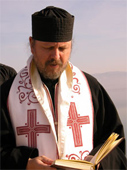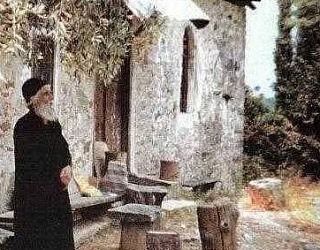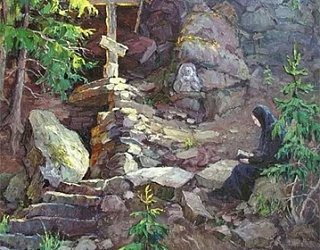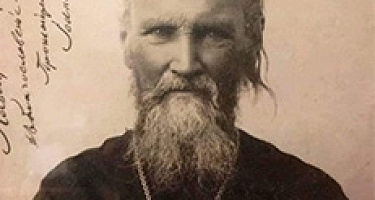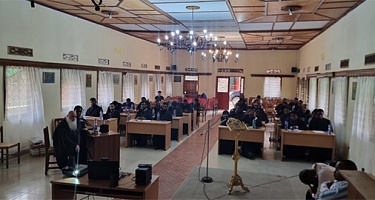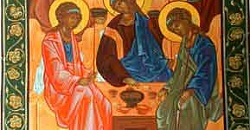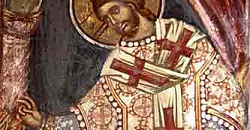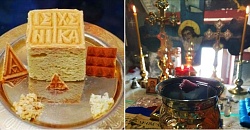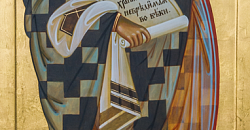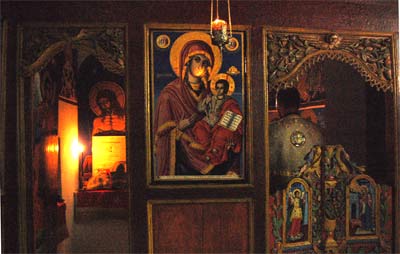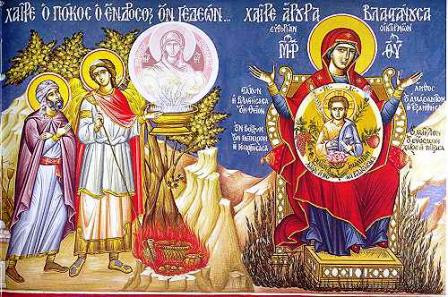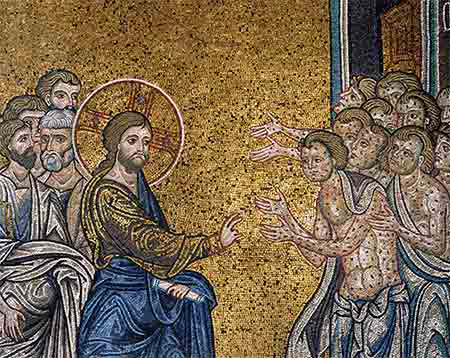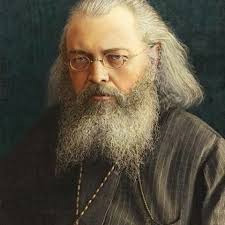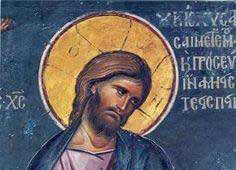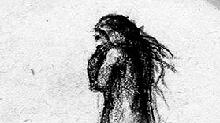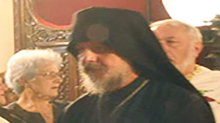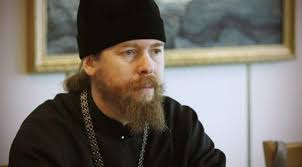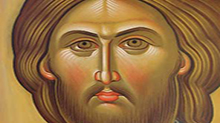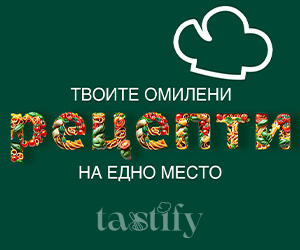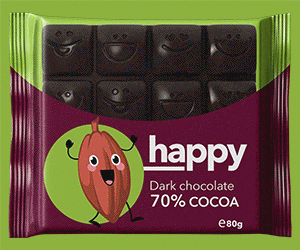(Обновено)
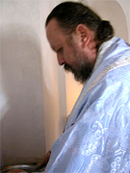
Деца, евангелието за блудниот син веднаш и доволно ќе го разбереме ако ги имаме предвид следниве теолошки рамки во кои се одвива дејствието на приказната: Човековата природа и Божјата благодат не се меѓусебно спротивставени туку, токму напротив, се подразбираат. Човекот престанува да биде вистински човек ако го промаши своето сопствено предназначение, односно личната заедница со Бог и непрестајното растење и восовршување во неа, со помош на Божјата благодат. Исто така и човековата слобода и Божјата благодат не се меѓусебно спротивставени туку, токму напротив, се подразбираат. Човекот престанува да биде вистински слободен кога ќе престане да ја исполнува Божјата волја и кога на тој начин ќе отпадне од Божјата благодат, односно ќе ја отфрли заедницата со Бог.
Но, да се вратиме на денешното евангелие.
„Рече Господ во приказна: еден човек имаше два сина.“
Постариот е образ и претставник на Стариот Израел, а помладиот е образ и претставник на Новиот Израел.
„Помладиот од нив му рече на татка си: татко, дај ми го делот што ми припаѓа од имотот.“
Кај помладиот син ја забележуваме слободата и свесноста дека му се обраќа на својот Отец Небесен и дека бара нешто што чувствува дека природно му припаѓа, но исто така забележуваме дека тој очигледно не ја сфаќа и самата природа на имотот чија поделба ја бара. Но, да не должам, што е нашиот вистински имот? Тоа е полнотата на Божјата Благодат која сите ние ја примаме во нашите срца на денот од светото Крштение; која ниту заради множеството на оние што ја примаат се зголемува и ниту од истата причина се намалува; која ниту се дели, ниту се умножува.
„И таткото им го раздели имотот.“
Бог и Отец на секого од нас подеднакво, без збор и без услов, ни ја дава полнотата на Својата благодат. Од нас самите, од нашата слободна волја зависи како ќе се однесуваме кон таа благодат, како и кога, колку и дали ќе ја употребиме. Бог само внимава да не ја наруши нашата слобода, а со тоа и нашиот взаемен однос: Родител – дете. Деца, ние немаме ништо посвето од овој однос! Овој однос е единствената надеж на нашето спасение!
„После неколку дена, помладиот син, кога собра сѐ, отиде во далечна земја и таму го потроши својот дел, живеејќи блудно. И откако потроши сѐ, настана голем глад во таа земја и тој се најде во неволја; па отиде при еден човек од таа земја и се погоди, и тој го прати во своето поле да пасе свињи. И страден беше да го наполни својот стомак со корења што ги јадеа свињите, но никој не му ги даваше.“
Зошто после неколку дена? Демонот не нѐ навлекува на злото и гревот одеднаш туку постепено затоа што ако од почеток ни ја открие неговата крајна цел сигурно ќе нѐ преплаши и ќе нѐ одврати од гревот. Демонот нѐ лови како и ловците што ги ловат бесловесните животни, преку примамливи мамки од кои не се гледа смртната стапица. Непросветленоста во духовната борба е исто што и бесловесност. Затоа е потребно духовно раководство и апсолутно послушание кон духовниот раководител до доволната зрелост на просветлението. Значи, демонот, прво го наговара помладиот син да побара и присвои ‘дел’ од она што не се дели и што не се присвојува само за себе, а потоа, врз основа на утврдената и прифатената помисла дека ‘нешто има’, го прелажува да се одлучи на самостоен и себедоволен живот. Зарем не ве потсеќа сето ова на оние што гледањето на првата светлина го злоупотребуваат, и кои помислувајќи си дека достигнале просветленост на умот и дека нешто знаат и умеат, одлучуваат заради тоа духовно да се самораководат, а уште полошо, и други да раководат? Да, тоа е токму тоа! Деца, запамтете: просветленоста не е знаење, тоа е сила и власт на умот, на словото и на делата, односно на севкупното присуство.
Зошто далечна земја, односно кое место може да биде толку далечно од Сегдеприсутниот? Тоа ‘место’ пред сѐ е неисполнувањето на Божјата волја, пројавено како непослушание кон духовниот отец и предвремено духовно самораководење, заради што Божјата благодат постепено се оддалечува од нас. Како што послушанието носи со себе смиреност, собраност во молитвата и просветлување на умот (послушниот нема потреба од грижа за што било), така и непослушноста или веќе пројавената гордост носи со себе расејување и затемнување на умот. Расејувањето на умот преку сетилата, грижата за овоземните работи и иднината, фантазиите, демонските предлози во вид на помисли и паранојата, според светите Отци е вистинскиот блуд на нашата душа и основа за секој понатамошен блуд. И нормално, секој што живее блудно го потрошува својот ‘дел од имотот’ односно ја губи Божествената благодат и останува, сиромашен и гладен, надвор од заедницата со Бог.
Ако се сетиме сега на погоре поставените теолошки рамки во кои треба да ја читаме оваа евангелска приказна веднаш ќе ни стане јасно за каква голема глад станува збор и во каква неволја се нашол блудниот син. Ние сме од Бог и заради Бог создадени и само со Него можеме да бидеме исполнети, во секоја добра смисла на зборот. Бог е и наш родител, и наш најблизок, и наша радост, и наша утеха, и наша трпеливост, и наша издржливост, и наше покајание, и наши солзи, и наша молитва, и наша љубов, и наша слобода, и наша среќа, и наше здравје, и наша храна, и наше питие, и наша облека, и наша иднина, и наша цел, и наша сила и сѐ наше.
Но човек, што чувствува духовна глад и празнотија, а по грешка мисли дека вистинската храна за него е задоволувањето на неговите страсти, всушност станува пасач на свињи (страсти) и вработен на демонот. Не знае сиромавиот дека задоволувањето на страстите отвора само нов и поголем апетит и создава чувство на поголема глад. Таква е незаситната природа на страстите, потребата од нивно постојано и сè поголемо задоволување води кон смрт на човекот; прво на душата, а потоа и на телото.
Деца, да ве потсетам уште на ова: состојбата на ‘блуден син’ може да ни се повтори и на вториот степен од духовниот развој – просветлување на умот. Ако таа состојба на првиот степен значи злоупотреба на првото гледање на несоздадената светлина или на светлината што доаѓа од чистењето на енергијата на умот, истата состојба на степенот од просветленост се пројавува како злоупотреба на светлината што доаѓа од чистењето на суштината на умот. Секој оној што во текот на умносрдечната молитва ќе го восредоточи своето внимание на ефектите и споредните плодови на молитвата, наместо на Христос со Кого преку молитвата на срцето стапуваме во заедница, ќе доживее затворање на срцето и прекин на умносрдечната молитва, сѐ додека не се покае и не сфати каде греши. Поголема беда од тоа, здравје... Што вели еврејската клетва: да имаш, па да немаш!
Митрополит Струмички Наум
(според записот на сестрите)
Беседа за блудниот син (втор дел)

Sermon on the Prodigal Son (Part One) ( 24.02.2008 )
Children, we will immediately and adequately understand the Gospel reading on the prodigal son if we take into account the following theological framework in which the plot in the story line unfolds: Human nature and God’s grace are not mutually opposed but, quite the contrary, they imply each other. Man ceases to be a real man if he misses his own preordination, that is to say, the personal unity with God and the continuous growing and perfecting in it, helped by God’s grace. Also, human nature and God’s grace are not mutually opposed but, quite the contrary, they imply each other. Man ceases to be truly free when he stops fulfilling God’s will and in such way he will fall from God’s grace, viz., he will renounce unity with God.
But let us go back to today’s Gospel reading:
“And the Lord said in a parable: A certain man had two sons:”
The elder son is the image and representative of Old Israel, whereas the younger is the image and representative of New Israel.
“And the younger of them said to his father, Father, give me the portion of goods that falleth to me. “
With the younger son we notice the freedom and the awareness that he is addressing his Father in Heaven and that he is asking for something that he feels it naturally belongs to him, however, we also notice that he obviously does not understand the very nature of the property whose division he seeks. But, let me be brief, what is our true property? It is the fullness of God’s Grace which we all receive in our hearts on the day of holy Baptism, which neither increases for the multitude of those who receive it, nor does it decrease for the same reason; which neither divides, nor multiplies itself.
“And the father divided unto them his property.”
God and Father of us all, equally, without a word and without any conditions, gives us the fullness of His grace. It is up to ourselves, our free will, how we will behave toward that grace, as well as how and when, how much and whether we will make use of it. God only takes heed not to disrupt our freedom, and along with that our mutual relationship: Parent-child. Children, we have nothing more sacred than this relationship! This relationship is the only hope for our salvation!
“And not many days after the younger son gathered all together, and took his journey into a far country, and there squandered his wealth with riotous living. And when he had spent all, there arose a mighty famine in that land; and he began to be in want. And he went and joined himself to a citizen of that country; and he sent him into his fields to feed swine. And he would fain have filled his belly with the husks that the swine did eat: and no man gave unto him.”
Why only after few days? The demon does not accost us to evil and sin all of a sudden but gradually, because if he reveals his final destination from the beginning he will certainly frighten us and deter us from sin. The demon hunts us just like the hunters hunt irrational animals, with alluring baits from which one cannot see the deadly trap. Lack of illumination in the spiritual struggle is the same as irrationality. This is why it is necessary to have spiritual guidance and absolute obedience to the spiritual father until sufficient maturity of illumination has been achieved. Thus, the demon first persuades the younger son to ask for and embrace a ‘portion’ of what is not divided and is not attained for oneself, and then, on the basis of the determined and accepted thought that ‘there is something’, he deceives him to decide on independent and self-sufficient life. Does this not remind you of those who abuse the seeing of the first light, and who, thinking that they have reached illumination of the mind and that they know and are able, decide for that matter to guide themselves spiritually, and even worse, to guide others, too? Yes, this is exactly it! Children, remember: illumination is not knowledge, it is power and authority of the mind, of the word, and of the deeds, that is to say, of the consummate presence.
Why a remote land, or which place can be so far away from the Omnipresent? That ‘place’ is above all, the non-fulfilling of God’s will, manifested as disobedience to the spiritual father and premature spiritual self-guidance, due to which God’s grace gradually distances itself from us. As obedience brings humility with itself, concentration in prayer and illumination of the mind (the obedient does not have to worry about anything), so does disobedience or already manifested pride bring with itself scattering and darkening of the mind. Scattering of the mind through the senses, worry for earthly things and the future, fantasies, demonic suggestions taking on the appearance of thoughts, as well as paranoia, according to the holy Fathers, is the true prodigality of our soul and a basis for every subsequent prodigality. And normally, everyone who lives prodigally spends his ‘portion of the property’, that is, he loses God’s grace and remains miserable and hungry, outside of the unity with God.
If we recall the above-established theological framework in which we should read this Gospel story we should immediately realize what kind of great hunger is under consideration and in what kind of trouble the prodigal son has found himself to be. We were created by God and for God and with Him only can we be fulfilled, in every good sense of the word. God is our parent, and our closest neighbor, and our joy, and our comfort, and our patience, and our perseverance, and our repentance, and our tears, and our prayer, and our love, and our freedom, and our happiness, and our health, and our nourishment, and our drink, and our clothing, and our future, and our aim, and our strength and all things ours.
But a man who feels spiritual hunger and emptiness, and mistakenly thinks that the true nourishment for him is satisfying his passions, in essence becomes a herder of pigs (passions) and is en employee of the demon. The poor man doesn’t know that satisfying one’s passions only opens new and greater appetite and creates a feeling of even greater hunger. Such is the insatiable nature of passions, the need for their continuous and ever-greater satisfying leads man to death, first of the soul, and then of the body.
Children, let me remind of this as well: the state of the ‘prodigal son’ may repeat itself on the second stage of spiritual development—illumination of the mind. If that state at the first level means abuse of the first seeing of the uncreated light or of the light that comes from the purification of the energy of the mind, the same state at the degree of illumination manifests itself as an abuse of the light that comes from purifying the essence of the mind. Everyone who, in the course of the mind-and-heart prayer will concentrate his attention on the effects and the side fruits of the prayer, instead of concentrating on Christ with Whom we enter into unity through prayer, will undergo a closing of the heart and a cessation of the mind-and-heart prayer, until he repents and understands where he did wrong. Hardly will there be a greater misery than this… As the Jewish curse says: to have, and to have not!
Metropolitan Nahum of Strumica
(as recorded by the monastery sisterhood)
Посети:{moshits}


